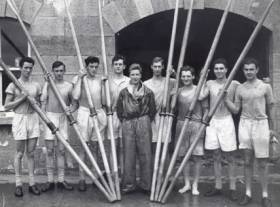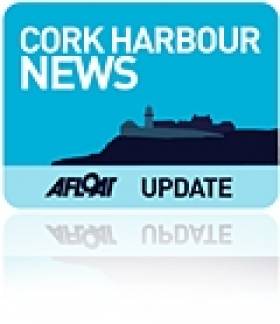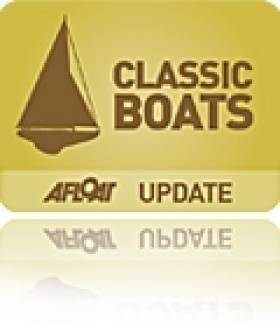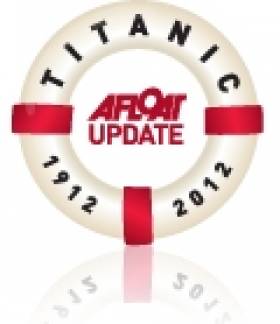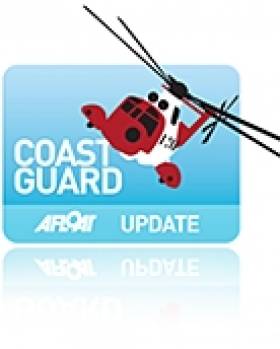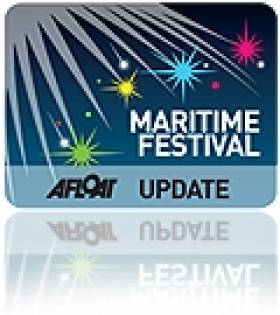Displaying items by tag: centenary
UCD Boat Club Celebrates 100 Years
#Rowing: UCD Boat Club celebrates 100 years in existence with a special dinner and awards ceremony this Friday, November 17th. Over 400 people from all around the world will attend the event at the O’Reilly Hall on the UCD Campus. They will include 50 past captains and nine past presidents of UCD Boat Club, and there will also be Olympians, World Championship medallists and winners at Henley Royal Regatta.
Dr Michael Cleary, who is 91, will travel to the ceremony from the United States with a big family group. The medical doctor joined UCD Boat Club as an undergraduate in 1946 and rowed with it for five years.
100 Years Since Rosslare Lifeboat's Daring Rescues In Hallowe'en Gales
#RNLI - Today – 1 November 2015 – marks 100 years since the end one of the most daring days in the history of Rosslare RNLI, when the station's volunteers rescued six crews within a single 24-hour period.
With the Wexford coast being assailed by easterly Force 7 gales on Hallowe'en that climbed to Force 10 overnight, and vessels in Rosslare Harbour dragging their anchors towards danger, the lifeboat crew rowed right into the thick of it - plucking crews from schooners and other vessels that would soon after be bound for the seabed.
The RNLI has much more on the story HERE.
Lusitania Commemorations Begin In Cork Harbour
#Lusitania - Commemorations for those who died in the sinking of the Lusitania 100 years ago began in Cork Harbour yesterday (Sunday 1 February), as The Irish Times reports.
Starting with the tolling of St Colman's Cathedral's 49 bells in the heart of Cobh – which took in many of the dead and injured after the Cunard liner was sunk by a torpedo from a German U-boat off Kinsale on 7 May 1915 – the evening also saw the firing of ceremonial flares over the harbour.
And Co Cork Mayor Alan Coleman was among those speaking at the event to remember what he described as "the greatest maritime tragedy off our coast".
Yesterday's event was the first in a series of commemorations to be held over the next four months at places connected with the Lusitania's final voyage.
Programme Of Events For Asgard Centenary Commemoration
#Asgard - The official commemoration of the centenary of the landing of arms from the yacht Asgard at Howth and the subsequent loss of life at Bachelors Walk will take place on Sunday 27 July.
Descendants and relatives of the key participants will be guests of honour at these events, 100 years and a day after Erskine Childers' yacht delivered its cargo to the Irish Volunteers in their fight for home rule.
The programme begins with a wreath-laying ceremony at Glasnevin Cemetery at 9am, led by new Minister for Arts, Heritage and the Gaeltacht Heather Humphreys, in memory of the four members of the public shot at Bachelors Walk on Dublin's North Quays.
At 10am the Pro-Cathedral in Dublin city centre will hold a Mass in memory of the Bachelors Walk shooting victims, which will be attended by President Michael D Higgins.
The President will then join Minister Humphreys to address and lead the official commemoration ceremony by the Defence Forces at Howth Harbour's East Pier from 11.30am.
Following that, from 1pm the Asgard 100 Community Group will stage a re-enactment of the landing of arms, featuring a replica of the yacht Asgard and a flotilla of boats observed by President Higgins.
Local volunteers from the Howth GAA Club and marching volunteers from Dublin will unload and leave the pier with the consignment. Historical context to the events of 26 July 1914 will be provided by members of the Asgard 100 group throughout the proceedings.
Then at 1.30pm President Higgins will view the Asgard replica dinghy constructed by the Asgard 100 group and presented to the National Museum of Ireland (NMI).
The community element of the commemoration will continue after 2pm with a cultural programme featuring Brian Begley, Ceoltóirí Chluain Tarbh and St Brigid’s Pipe Band from Howth, which is free and open to the public.
Indeed, visitors are encouraged to attend in period costume, and prizes will be presented to the best period dressed individual male or female, family and boat crew.
Speaking at the presentation of the replica dinghy to the NMI, Minister Humphreys said: “I am very grateful to the volunteers of Howth for their generosity in giving their time and expertise to assist us to commemorate this important event in our history.
"There is no doubt that the landing of arms in Howth was a significant milestone along the road to Easter 1916 and I am delighted to support arrangements to mark this centenary in an appropriate way.”
Walking Tours a Highlight of Belfast's TItanic Festival
#TITANIC - Belfast's Titanic Festival is set for 31 March to 22 April, with lectures, concerts, plays, city tours and exhibitions among the events lined up to recognise the centenary.
The centrepiece will be a wreath laying ceremony at the Titanic Monument at Belfast City Hall, in remembrance of the 112 Ulster natives who died when the ill-fated ship went down on 12 April 1912.
Visitors to the city during the festival can take part in various walking tours, both solo - using a portable 'Node Explorer' available from the Belfast Tourist Bureau - and escorted, with most having the memorial as their starting point.
The National's Kevin Pilley follows one tour guide, former soldier Pat, on his two-hour Titanic-themed tour around the city.
Pat has a specific connection to the TItanic, as his grandfather Danny died in the tragedy - but little does he know Pilley's own connection to that fateful day.
The National has more on the story HERE.
Coastguard Takes Delivery of New Chopper
#COASTGUARD - The Irish Coast Guard has taken delivery of its new search and rescue helicopter at its Shannon base, The Irish Times reports.
As previously reported on Afloat.ie, Sikorsky completed production of the new S-92 helicopter for the Irish Coast Guard last December under the rescue service's €500 million deal with CHC Ireland to revamp the aircraft fleet.
The deal will also see the coastguard's remaining four Sikorsky S-61s replaced by second-hand S-62s from Scotland over the coming months.
Training with crews at Shannon is set to begin shortly ahead of the S-92's first public demonstration at the centenary of the Titanic’s departure from Cobh in Cork Harbour.
Meanwhile, it is expected that the Air Corps may be offered an upgraded air ambulance role, after they were ruled out as contenders for search and rescue work amid some controversy.
The Department of Health has reportedly been in exploratory talks with private firms regarding the provision of an inter-hospital emergency air transfer service, as called for by the Roscommon Hospital Action Group.
The Irish Times has more on the story HERE.
Requiem for Titanic Victims on 100th Anniversary
#TITANIC - Philip Hammond's Requiem for the Lost Souls of the Titanic will be staged at St Anne's Cathedral on the centenary of the tragedy, BBC News reports.
The Belfast composer has spent over three years working on the "haunting" music that will pay tribute to the more than 1,500 people who lost their lives when the TItanic sank in 1912.
His requiem uses phrases from variations of the 'Nearer My God to Thee' and takes influence from Irish folk songs from the 1792 Belfast Harp Festival.
Accompanying the music will be lyrics from the original Latin Requiem Mass sung by the Belfast Philharmonic Society, Anuna, the Schola Cantorum of St Peter's Cathedral, Belfast, and Cappella Caeciliana.
The cathedral itself will also be part of the story, with seating arranged to imitate that on a ill-fated ship.
"It is part of history and it is part of who we are," said Hammond of the Titanic story.
BBC News has more on the story HERE.
Titanic Artifacts a Snap - at $189 Million!
#TITANIC - The Titanic is for sale - if you have a spare $189 million to spend, according to the Los Angeles Times.
The single-lot auction, which will take place in April on the 100th anniversary of the Belfast-built ocean liner's tragic demise, includes more than 5,000 items salvaged from the wreck, from gold coins and clothing to parts of the ship's hull itself.
But casual buyers need not apply, as aside from the multi-million-dollar outlay, the prospective purchases must also take on stewardship over the collection, preserving it for future generations and exhibiting parts of it to the public.
Arlan Ettinger, president of Guernsey's Auctioneers & Brokers in New York, commented: "It's like getting a puppy. When you bring it home, you don't think of all the responsibilities and the time and investment that will be required... But it takes great care."
Images of the items up for auction are available HERE.
Dr John de Courcy Ireland Remembered at Connemara Maritime Festival
Ireland's leading maritime histortian will be remembered during Conamara Sea Week, which starts next Friday.
The 10-day programme celebrating the west of Ireland's rich maritime heritage kicks off just two days after the centenary of the late Dr John de Courcy Ireland, who tirelessly documented Ireland's relationship with the sea in parallel with a distinguished career as a political activist.
According to The Irish Times, he will be remembered during a conference on 'The Sea as Inspiration' on Saturday 29 October in Letterfrack, Co Galway.
Education and arts are major themes of the maritime festival, which will also feature an exhibition of works from emerging artists.
For more details visit the website of the Conamara Environmental Educational and Cultural Centre at ceecc.org.



























